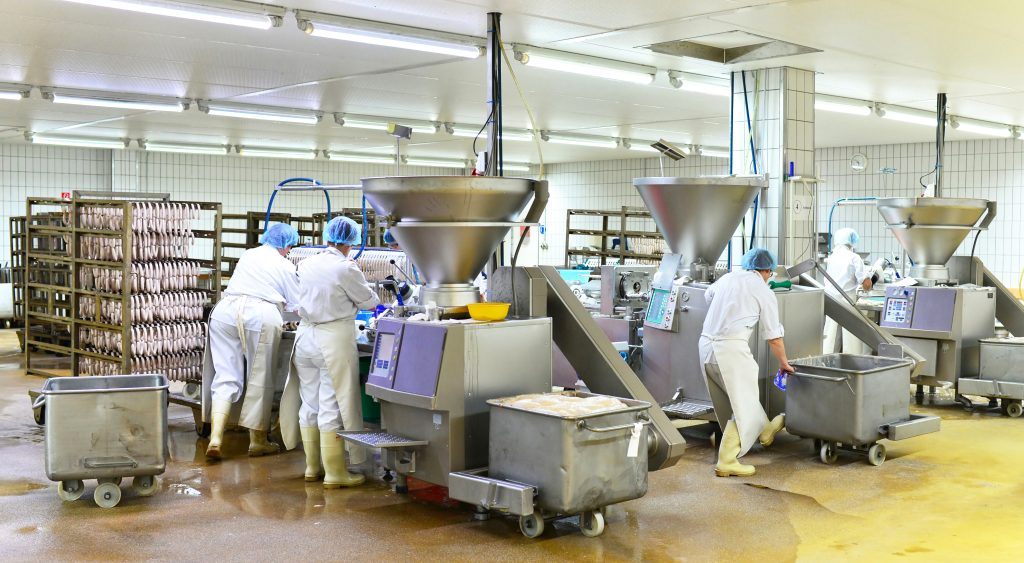
Overcoming labour challenges in food and beverage manufacturing
Over the past two years, the Canadian manufacturing sector has faced innumerable challenges, but nowhere do these issues seem more prominent than in food and beverage manufacturing.
April 4, 2022 | By EMC
 PHOTO © MARTIN BARRAUD/KOTO / ADOBE STOCK
PHOTO © MARTIN BARRAUD/KOTO / ADOBE STOCK 
PHOTO © MARTIN BARRAUD/KOTO / ADOBE STOCK
Whether it be grappling with heightened manufacturing costs, shipping and transportation delays, or the myriad of issues brought about by the COVID-19 pandemic, food and beverage manufacturers have been forced to significantly alter their processes and expectations to remain competitive on both domestic and international shores.
The most pressing obstacle to success in this field, though, is undoubtedly the labour shortage; it has never been more difficult for employers to find workers, let alone properly train and retain them. As such, leaders in this field must adapt and modernize long-held recruitment methods to appeal to today’s job-seekers and should have a thorough and complete understanding of why current workers are abandoning their posts at an unprecedented rate.
Let’s discuss some of the labour challenges in food and beverage production and determine how they can be addressed.
The examination of current data metrics regarding labour in food and beverage manufacturing is essential to establishing proper contextual awareness. According to EMC ManufacturingGPS Employer LMI Survey, 2020, as of 2020, employers in this field have reported a 22.9-per cent increase in their workforces’ voluntary turnover rate as compared to general Canadian industry averages.
This begs the question: why do food and beverage labourers quit their positions nearly one-quarter more than workers in other manufacturing industries do? The answer becomes less ambiguous when we look at average employee wages. According to EMC ManufacturingGPS Employer LMI Survey, 2021, in 2021, labourers in food and beverage manufacturing were paid 9.7 per cent less than the general sector standard.
This problem is present throughout the field’s corporate ladder; production supervisors are paid 11.3 per cent less than the manufacturing sector average, and managers are paid 4.6 per cent less. Wage increases are expected soon, but when forecasted to range between one per cent and 1.9 per cent according to EMC ManufacturingGPS Employer LMI Survey – Food and Beverage Sector, 2021, they will not be enough to alleviate disparities with Canadian manufacturers in other industries.

PHOTO © INDUSTRIEBLICK / ADOBE STOCK
As issues stemming from the COVID-19 pandemic continue to weigh heavily on workers’ minds and influence their career decisions, it is important for leaders in food and beverage manufacturing to recognize employee demands and expectations, and take the necessary financial measures to meet them.
When asked why positions in the food and beverage manufacturing industry were so difficult to fill, one of the reasons most frequently offered by business leaders was low employee work ethic, according to the EMC ManufacturingGPS Employer LMI Survey – Food and Beverage Sector, 2021. When demand for labour is high and supply is low, it is the responsibility of employers to motivate and energize their workforce.
Contextual awareness is important here as well. Workers in food and beverage manufacturing must follow a strict set of guidelines unique to this sector and must possess specific knowledge and skillsets to prevent issues with waste or contamination. Employers should also recognize causes of disillusionment outside of the workplace, and should implement methods of either eliminating, alleviating, or offsetting these challenges.
Fortunately, effective workplaces can be maintained without significant expense or modification of existing production methods. Organizations that see low voluntary and involuntary turnover rates have long touted the value of individual respect, unique skill acknowledgement, and high degrees of employee autonomy, and ensure that these ideals are constantly practiced by all levels of management and supervision.
Food and beverage manufacturers would do well to remember that each of their employees is a smart, opinionated individual, and should be treated as such on and off the job, lest they abandon their post for a competing business.
Employers partnered with EMC have access to resources focused on strengthening employee work ethic, and through specialized events held exclusively for those in food and beverage manufacturing, fully understand how to keep their labour force positive and productive, regardless of the challenges they may face.
In EMC Senior Manufacturing Management Survey, 2021, business leaders in food and beverage production identified a shortage in skilled labour to be the most significant plant management issue for 2022.
To prevent issues with food safety, lost productivity, and employee disillusionment, leaders in this field must ensure that their teams receive the highest level of training, instruction, and supervision, and should take great strides towards accountability and professionalism at every stage of the corporate ladder.
Business leaders should always realize the importance of respect and acknowledgement in training, as employees that feel confident and validated are often far more eager to learn and develop their skillsets than those that don’t. Through proper recognition of their individual achievements, workers will better understand the benefits of correct work processes.
Employees at every level of the production process are integral. According to EMC ManufacturingGPS Data — Expected Hires in the next 12 Months, Food & Beverage Sector, 2021, food and beverage manufacturers overwhelmingly intend to recruit production labour in 2022, with positions in food chemistry, science, and design receiving far less attention. In an age when even entry-level jobs are difficult to hire for, industry leaders should keep in mind many of the challenges specific to their sector that only advanced support can navigate through. Issues like rising energy costs, food spoilage, and order fulfillment cannot be solved by managers or production labourers alone; they require a steady stream of dedicated professionals to thoroughly understand the situations surrounding them and develop effective methods of circumvention. If manufacturers and food processors are unable to find or fill technical roles, candidates are hired for fit and organizations train and teach the skills required for new hires to be successful in their role.
Food and beverage production can often seem like a small-scale version of the Canadian manufacturing sector, but along with having one of the highest growth rates in the sector, as well as being responsible for purchasing about 70 per cent of Canada’s agricultural output, it faces issues like other industries, a notably increased rate.
In the wake of the COVID-19 pandemic, though, leaders in this space have a unique opportunity to revitalize their businesses through modernized retention processes, effective training, recruitment diversification, and most importantly, employee recognition. By effectively realizing these opportunities, food and beverage manufacturers can sustain productivity, efficiency, and profitability in the long-term, and keep themselves well-prepared and well-equipped to overcome future challenges as they are revealed.
EMC recognizes that success in manufacturing is a collaborative effort, and that strong productivity requires constant cooperation between leaders and their team. The manufacturing industry is an ever-shifting entity, and success in this field can only be found through communication and the mutual sharing of experience.
__________________
Article provided by EMC.
